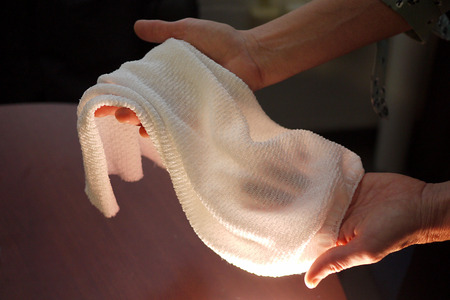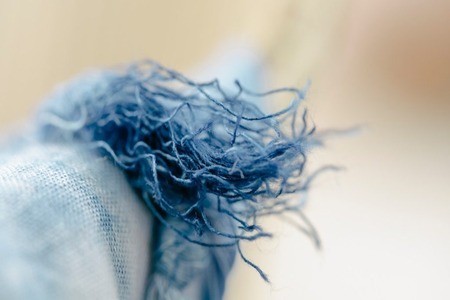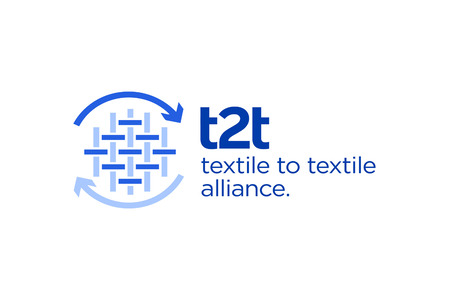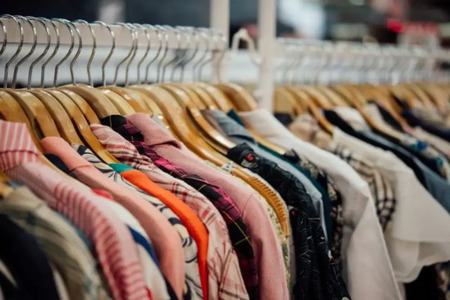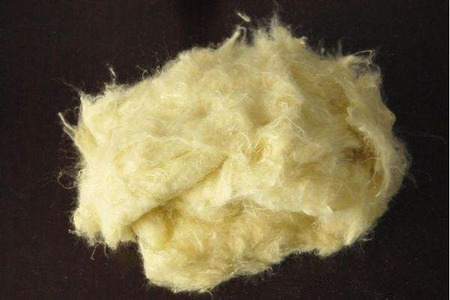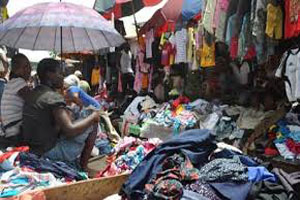
Nigeria textile industry urge govt to find solution to curb smuggling and develop industry
YarnsandFibers News Bureau 2014-11-08 10:00:00 – LagosNigerian textile industry urging the government to find a win-a-win solution to curb the smuggling activities of textile materials into the country due to which the economy is losing so much in terms of revenue in taxes.
Also as a result of the smuggling activities, the 100b textile revival intervention fund introduced by the federal government will not be able to achieve much. The cost of manufacturing textiles in Nigeria is too high, allowing room for cheap foreign goods to be imported.
They are also calling for the formulation of a protectionist policy for the industry to bounce back to its glorious days.
The key problems facing the industry are infrastructural inadequacy, raw materials, electricity supply, smuggling, counterfeiting and faking among others which need to be urgently addressed by the government.
The smuggled products occupy over 90% of the market, while it is estimated that Nigeria imports N300 billion worth of textiles and garments annually, most of which are illegally imported without paying any duties and taxes.
The total amount of revenue loss on account of customs duty and VAT on this volume is estimated at N75 billion. Such rampant evasion of taxes through smuggling when the government is mobilising revenue should be an eye opener.
The President of the Nigeria Textile Manufacturers Association of Nigeria (NTMAN), Olanrewaju Jaiyeola, said that the country had about 175 textile factories in the 1980s, the number shrank to 124 in 1994, and 70 in 2002, the drastic drop in 2002 followed the lifting of the ban on the importation of foreign fabrics in 1997 resultant the market was flooded with foreign textile products within five months of the lifting of the ban.
At the moment, there are only 10 textile mills in the country, the lifting of ban on the importation of textile products paved the way for dumping of all sorts of textile products in the country.
Moreover, lack of basic infrastructure such as electricity supply forced many mills to close down, while some relocated to Ghana.
The President of the Chamber of Commerce, Industry, Mines and Agriculture, Onitsha chapter, Dr Tim Anosike, said that 10,000 jobs were lost following the closure of the three textile mills in the area, attributing the closure to the lack of government policies to protect them against foreign competitors as well as to lack of government and corporate patronage of the products of the mills.
The Commissioner for Commerce in Ogun state, Bimbo Ashiru, attributed the failure of textile mills in parts of the country to the lack of funds and indiscriminate importation of foreign fabrics, recalling that Shokas Lace factory in Ijebu-Igbo and Austro Embroidery mill in Aiyepe, both in Ogun state, could not survive because the companies could not easily source for foreign exchange to import some materials.
Accordinf to National Chairman, Nigerian Textile Manufacturers Association (NTMA), Ibrahim Igomu, the textile industry, in its glorious years, was the highest employers of labour outside the government.
The textile industry stakeholders are calling on the government to formulate a protectionist policy for the textile industry so as to guide against the dumping of foreign materials as well as to check mate the activities of unscrupulous people in the sub sector.
The president of Benin Chamber of Commerce, Industry, Mines and Agriculture (BENCCIMA), Andy Edobor, urged the government to formulate policies that would encourage and protect investors in the textile sector. Reviving the industry would reduce foreign exchange spent annually on the importation of textile materials.
The Commissioner for Commerce and Industry in Zamfara state, Alhaji Ibrahim Maru, described the situation in the sector as a big threat to the national economy, saying that the dumping of foreign textile materials in Nigeria and constant power failure led to the high cost of local textile products.
The only way factories could be revived is by ensuring effective provision of power supply, control in the import of textile materials and implementation of indigenisation policy by government.
Effect of N100b intervention fund by the Bank of Industry has had some impact on the textile industry with about 60 billion of the CTG fund having disbursed to various beneficiaries under the scheme.
Over 60% has been committed to 52 companies in the Cotton, Textile and Garment Industry as at March, 2013. The re-opening of United Nigeria Textiles Limited in Kaduna is one of the numerous positive impacts of this scheme.
A mid-term evaluation of the CTG industry commissioned by BoI/UNIDO to evaluate the impact of the scheme reveals that over 8,070 jobs had been saved through the intervention, adding that capacity utilization for most beneficiaries has increased from below 40% to about 61% at the time over 50% of those making losses has started reporting profits.
Meanwhile, the National Chairman, Nigerian Textile Manufacturers Association (NTMA), Ibrahim Igomu said that the N100 billion textile intervention fund went a long way in bringing a new lease of life into the activities of the textile industry as it provided an opportunity for industry players to have an injection of capital to upgrade machineries, modernize and replace obsolete equipment as well as assisted them to address some of the major challenges they are confronted with such as capital, infrastructure (poor road network, electricity supply) and high cost of fuel oil.
However, the major challenge faced by the industry today is that of smuggling from Asian countries, faking of existing trademarks and intellectual property infringement, also some unpatriotic businessmen fake trademarks of textile materials; imitate them and dump them on unsuspecting consumers.
The Nigerian borders have become so porous that market shares of genuine products have been eroded. When you smuggle these things, import duty are not paid which is a major challenge. These unpatriotic Nigerians together with their collaborators smuggle sub standard textiles into the Nigerian market.
Knowing that 80 to 90 percent of consumers with purchasing power are in Nigeria, if they look at the negative effect of the ECOWAS Common External Tariffs (CET), neighbouring countries like Togo, Benin Republic and Ghana are turned into grounds for smuggling into Nigeria. This is an area that they have made representation to the government.
Now that the government has addressed the difficulty in accessing fund with the injection of N100 billion into the textile industry, the issue of smuggling is still staring us in the face. The problem of intellectual property infringement is being addressed.
The aim of the intervention fund is to revamp the sector. When the sector is revamped, the sector can then employ more people. This way, more taxes are generated, which has a multiplier effect on the nation's economy.
Stakeholders in the textile industry have urged the Customs authorities and the Standards Organisation of Nigeria (SON) to strictly monitor the influx of counterfeit textiles across the borders as one of the way out to their problem.
The removal of tariffs on textile raw materials, such as polyester fibre and pigments has also been called for. Also ban on some categories of printed fabrics to protect the domestic industries.
Government policy of zero tolerance for sub-standard products was not only for the citizens of the country but to give credibility to Nigerian made products. The Standard Organisation of Nigeria (SON) must rise up to the occasion to address the issue of sub-standard products in the market, intellectual property infringement, trademark.
But, at the end of the day, the aim of the N100 billion intervention fund is defeated, if textiles manufactured in Nigeria having high quality and enormous potential, but trademarks are not protected as this gives room for copying and sub-standard manufacturing of such goods. Also the concerned agencies should confiscate smuggled textiles which will serve as a deterrent to other people who may wish to venture in such business.
Market Intelligence
Ask for free sample Report

experience
Customer Base
dedicated team
Countries Served Worldwide



